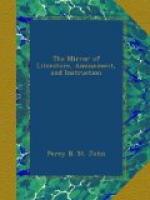The Ambarvalia were festivals in honour of Ceres, in order to procure a happy harvest. At these festivals they sacrificed a bull, a sow, and a sheep, which, before the sacrifice, were led in procession thrice around the fields; whence the feast is supposed to have taken its name, ambio, I go round, and arvum, field. These feasts were of two kinds, public and private. The private were solemnized by the masters of families, accompanied by their children and servants, in the villages and farms out of Rome. The public were celebrated in the boundaries of the city, and in which twelve fratres arvales walked at the head of a procession of the citizens, who had lands and vineyards at Rome. These festivals took place at the time the harvest was ripe.
The Vulcanalia were festivals in honour of Vulcan, and observed at the latter end of August. The streets of Rome were illuminated, fires kindled every where, and animals thrown into the flames as a sacrifice to the deity.
P.T.W.
* * * * *
THE NOVELIST
BEBUT THE AMBITIOUS.
“Hear this true story,
and see whither you may
be conducted by ambition.”
Hafiz, the Persian Poet.
In one of the suburbs of Ispahan, under the reign of Abbas the First, there lived a poor, working jeweller. In his neighbourhood he was known by the name of Bebut the Honest. Numberless were the proofs of probity and disinterestedness which had gained for him this title.
In all disputes and quarrels, he was the chosen arbiter. His decisions were generally as conclusive as those of the Kazi himself. Laborious, active, and intelligent, and esteemed by all who knew him, Bebut was happy; and his happiness was still enhanced by love. Tamira, the beautiful daughter of his patron, was the object of his attachment, which she returned. One thought alone disturbed his felicity; he was poor, and the father of Tamira would never accept a son-in-law without a fortune. Bebut, therefore, often meditated upon the means of getting rich. His thoughts dwelt so much on this subject, that ambition at length became a dangerous rival to the softer sentiment.
There was a grand festival in the harem. In the midst of it, the great Schah Abbas dropped the royal aigrette, called jigha, the mark of sovereignty among the Mussulmans. In changing his position, that it might be sought for, he inadvertently trod upon it, and it was broken. The officer who had charge of the crown jewels, knew the reputation of Bebut; to him he applied to repair this treasure. None but the most honest could be trusted with an article of such value, and who was there so honest as Bebut? Bebut was enraptured with the confidence. He promised to prove himself deserving of it.
Now Bebut holds in his hands the richest gems of Persia and the Indies. Ambition has already stolen into his bosom. Could it be silent on an occasion like this? It ought to have been so, but it was not.




